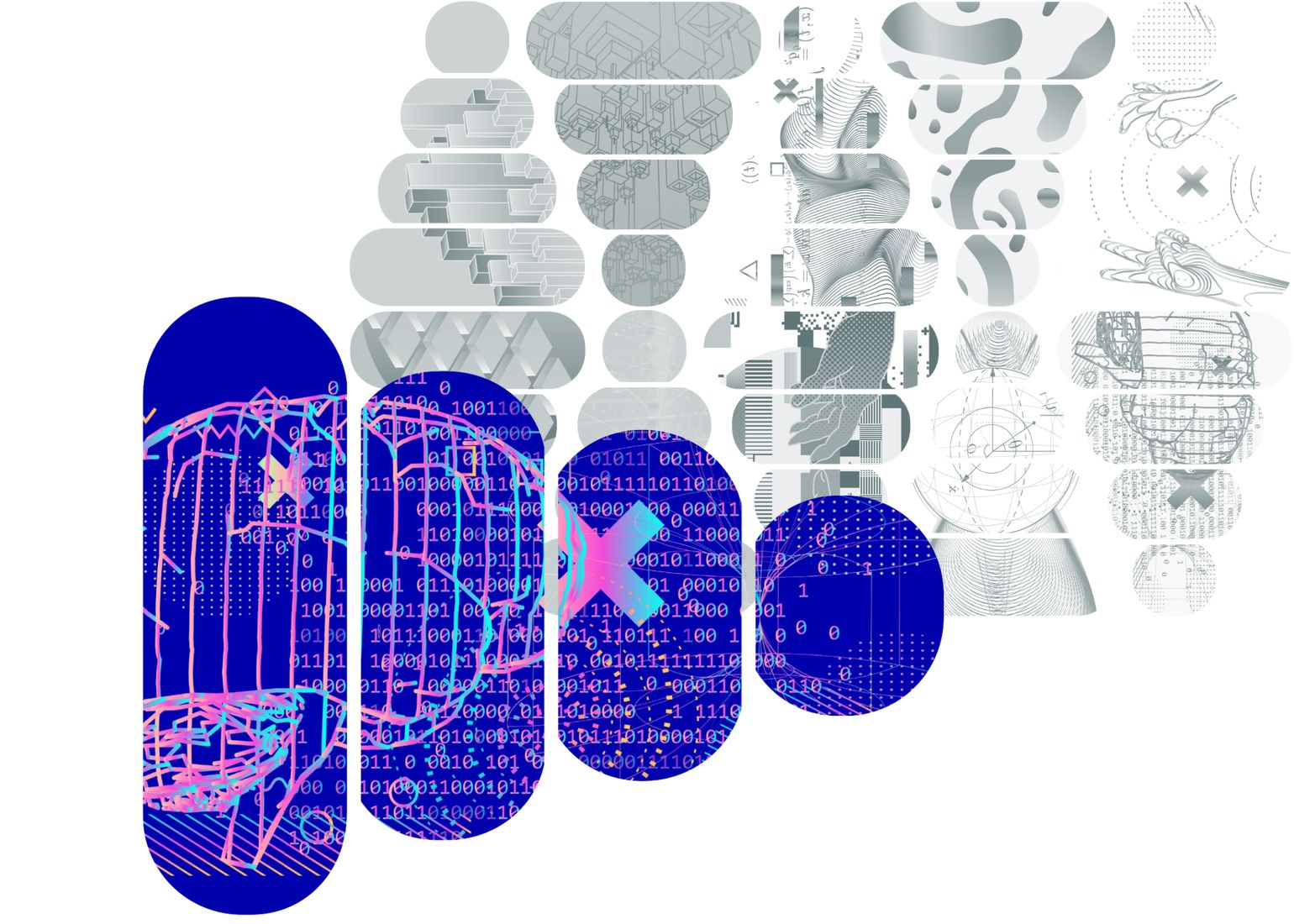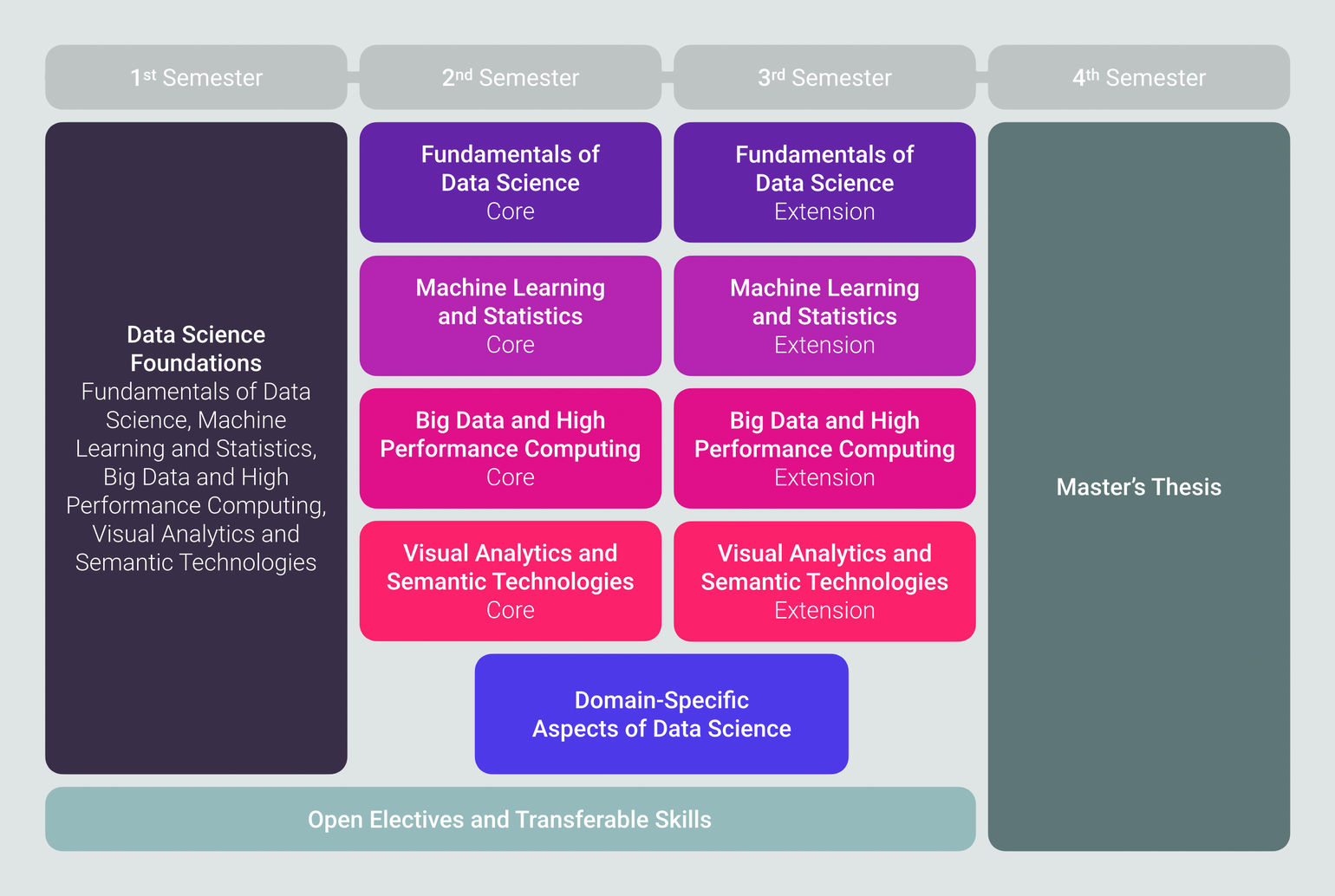Master Data Science
When data speaks, you know how to listen—if you’re driven to uncover the patterns and stories that lead to real-world impact, then this is the right master’s program for you!

Facts
- Duration: 4 Semesters
- ECTS: 120
- Degree: Dipl.-Ing. (equivalent to MSc)
- Language: English
- Curriculum: PDF / Courses
- Questions? — We have answers
Diese Seite in Deutsch.
About
Whether you’re drawn to the logic behind data-driven models or excited by the challenge of making sense of complex information, our master’s program Data Science gives you the skills to unlock the power of data to understand the world, uncover patterns, and drive decisions. You’ll learn to collect, process, analyze, and visualize data—mastering everything from anomaly detection and complex system modeling to trend forecasting and machine learning. Turn complexity into clarity with every step. This master’s program combines technical depth with the power to turn data into action, and provides you with the knowledge and skills to launch a successful career in both academia and the private sector.
What to expect?
We build from the basics: You’ll learn all fundamental principles of data science, statistical modeling, machine learning, data engineering, and algorithmic thinking. You’ll dive into the world of data by working with large, complex datasets—learning how to ask the right questions, build powerful predictive models, and transform raw information into clear, compelling insights. Detect patterns in big data, build responsible AI systems, and apply data science to solve challenges across science, society, and industry. You’ll be part of a dynamic, international research community—collaborating closely with faculty, researchers, and fellow students.
Why all this?
Because today’s most pressing challenges—from healthcare to sustainability—depend on data-driven insights to make informed decisions and solve wicked problems. You’ll learn how to build and evaluate statistical and machine learning models, design efficient data infrastructures, and communicate your findings clearly to drive meaningful outcomes. With a master’s degree in Data Science, you have a bright career ahead of you—not only in terms of salaries but also by shaping how we can make sense of the world with data.
Curriculum

The first semester is dedicated to getting around the foundations of Data Science with the modules Fundamentals of Data Science, Machine Learning and Statistics, Big Data and High Performance Computing, and Visual Analytics and Semantic Technologies.
Over the course of the second and third semesters, you’ll be able to deepen your knowledge in two or more key areas with core and extension modules that build directly on the foundational modules. The core and extension modules are complemented by the module Domain-Specific Aspects of Data Science, where you’ll explore the diverse data science needs of other disciplines.
The focus in the fourth semester lies on developing and writing up your master’s thesis.
Throughout your studies, a well-balanced set of open electives and extension courses deepen your knowledge of core competencies in Data Science and allow you to explore interdisciplinary areas, apply data-driven concepts in broader contexts, and develop valuable secondary skills.
Environment
You are deeply immersed in a rich environment full of exciting ideas and interesting challenges that foster your talents and provide new experiences:
- Participate in our student mobility programs! International exchange is in our DNA. Meet students, researchers, and lecturers from all over the world, participate in Erasmus, and join our double degree programs during your Masters.
- Show your excellence! With our TU Wien Informatics Awards, we celebrate outstanding student accomplishments at all levels and share them with the entire TU Wien community.
- Come for the Master; stay for the Doctorate! A master’s degree is the ideal preparation for a doctorate at the TU Wien Informatics Doctoral School. And we are always looking for excellent candidates for open positions in the scientific field.
- Get to know the people and research! We are proud of the distinguished scholars and researchers who make up our diverse faculty. Find out who they are, what projects our research units are working on, and stay in touch through our newsroom and social media channels.
- Enjoy Vienna! Our campus is located directly in the heart of Vienna. Besides Vienna ranking as the city with the highest quality of life and TU Wien Informatics in the Global Top 15% in Computer Science, there are numerous more reasons why you should study with us.
Be part of TU Wien Informatics and help us shape the technologies of the future - today!
Frequently Asked Questions
Which program is right for me?
How do I apply?
Can I send you my application documents for a pre-check?
I have questions about the formal application process or language requirements.
How is my application evaluated?
Your application is processed in three steps:
The admission office checks whether your application meets certain formal requirements. You need a degree on level 6 (bachelor) or higher in the European Qualifications Framework, and it should have been awarded by a recognized institution (classified as “H+” in ANABIN). Depending on your country of origin, further conditions may apply.
We check whether your bachelor degree covers fundamental education in the area of computer science, mathematics, and statistics.
We check whether the documents you have supplied with the application (like degrees, transcripts, certificates) allow us to conclude that your expertise in computer science and mathematics suffices to follow the master courses successfully.
At the moment, there is no restriction on the number of students admitted per term. You therefore don’t have to compete against other applicants for a limited number of places.
What are the admission requirements?
We check your documents (like transcripts and certificates) for expertise in the following four areas: algorithms and data structures, programming, database systems, mathematics, and statistics; for details see the modules INT/ADA (8 ECTS), INT/PRO (9.5 ECTS), WIN/DBS (6 ECTS), STW/ADM (9 ECTS), STW/ANA (6 ECTS), and STW/STA (6 ECTS) of the bachelor’s program in Business Informatics at TU Wien.
The numbers in parentheses indicate the extent of the area, measured in credits according to the European Credit Transfer System. One Ects corresponds to 25 hours of student work, 60 ECTS correspond to the work load of a year.
We are not picky about single ECTS credits, but you need a solid foundation in these areas to be admitted without further conditions. If you lack some of these foundations (up to 30 ECTS), you can be admitted under the condition that you do some extra courses to make up for it.
